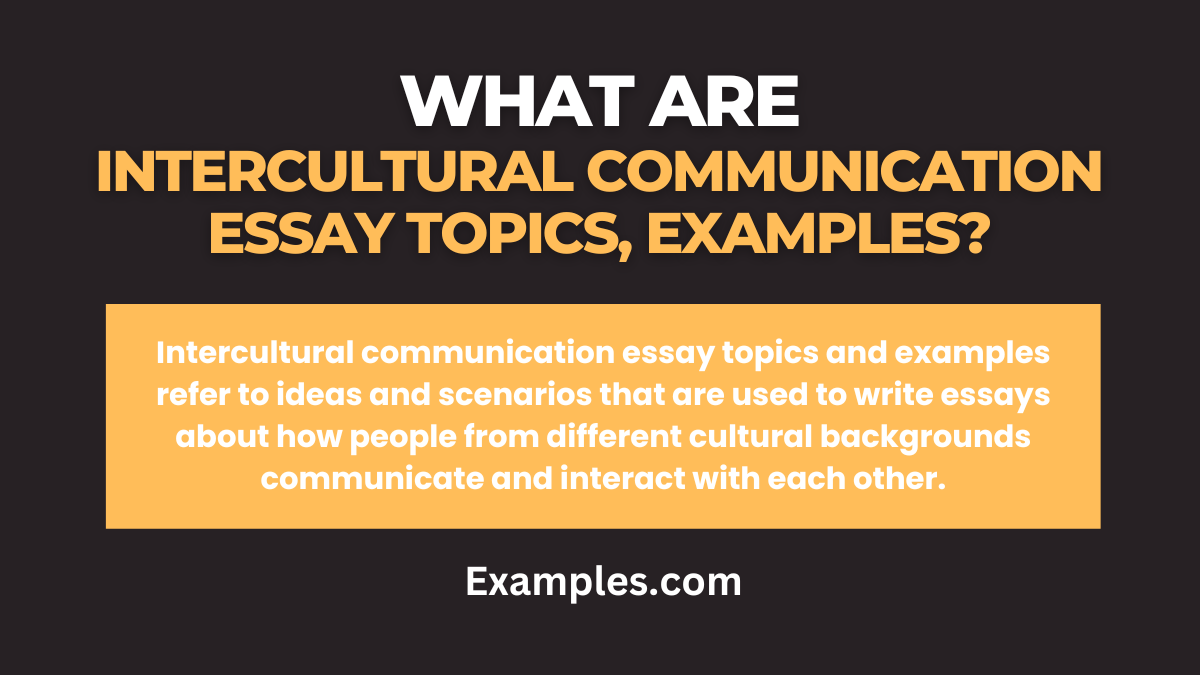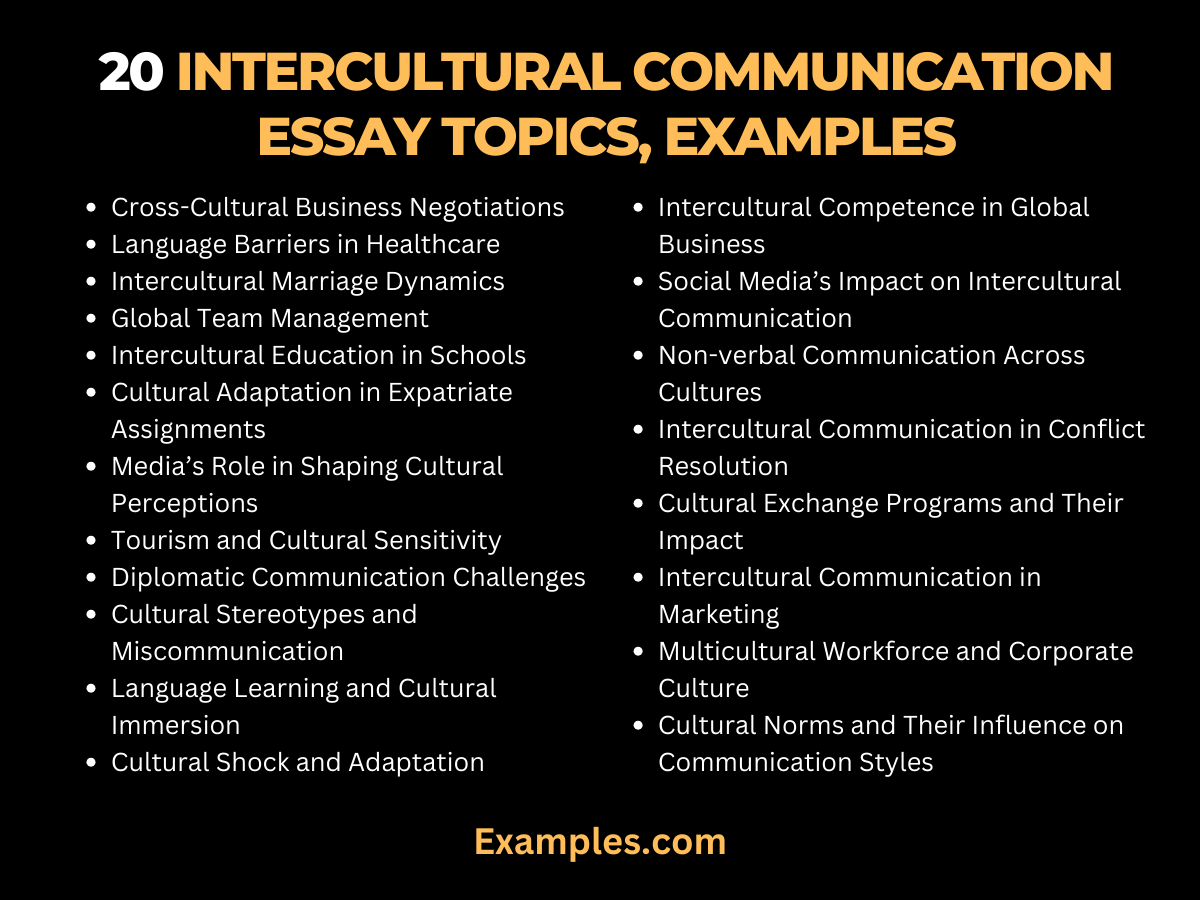Intercultural Communication Essay Topics Examples?
Delve into the engaging world of Intercultural Communication Essay Topics & Examples. This comprehensive guide, enriched with enlightening Intercultural Communication Examples, is your gateway to understanding and exploring the multifaceted aspects of intercultural interactions. Whether you’re a student crafting an essay, a teacher seeking topic inspiration, or a curious learner, these examples and topics will ignite your creativity and deepen your insight into the complexities and beauty of intercultural communication.
What are Intercultural Communication Essay Topics, Examples?

Intercultural communication essay topics and examples refer to ideas and scenarios that are used to write essays about how people from different cultural backgrounds communicate and interact with each other. These topics often explore the challenges, strategies, and importance of understanding and respecting different cultures in communication. Examples might include real-life situations, like how businesses from different countries negotiate deals, or theoretical discussions, like the role of language in bridging cultural gaps. These topics and examples help students and writers understand and analyze the ways in which our cultural backgrounds influence the way we communicate and interact with others in a diverse world.
20 Intercultural Communication Essay Topics, Examples
Discover a diverse range of Intercultural Communication Essay Topics & Examples, ideal for deepening your understanding of global communication. These topics, rich in cultural insights, are perfect for exploring the nuances of cross-cultural interactions. From business negotiations to personal relationships, these examples illustrate the complexity and beauty of communicating across cultures. Whether for academic essays or personal growth, these topics and examples provide a thorough understanding of the challenges and strategies in intercultural communication.

1. Cross-Cultural Business Negotiations: Explore how businesses from different cultural backgrounds negotiate deals. Understand the importance of cultural sensitivity, non-verbal cues, and the role of hierarchy in business discussions.
2. Language Barriers in Healthcare: Analyze the impact of language barriers in healthcare settings and the importance of interpreters. Discuss the challenges faced by healthcare providers and patients in understanding each other’s cultural and linguistic backgrounds.
3. Intercultural Marriage Dynamics: Examine communication in intercultural marriages. Focus on the importance of mutual cultural understanding, respecting differences, and adapting communication styles.
4. Global Team Management: Discuss the challenges of managing a culturally diverse team. Highlight strategies for effective communication, conflict resolution, and leveraging cultural diversity to enhance team performance.
5. Intercultural Education in Schools: Evaluate the role of schools in fostering intercultural communication among students. Discuss initiatives like exchange programs and multicultural events that promote cultural understanding.
6. Cultural Adaptation in Expatriate Assignments: Explore the experiences of expatriates adapting to a new culture. Discuss the importance of cultural immersion, coping strategies, and the role of cross-cultural training.
7. Media’s Role in Shaping Cultural Perceptions: Analyze how media influences perceptions of different cultures. Discuss the impact of stereotypes, cultural representation, and the need for culturally sensitive media content.
8. Tourism and Cultural Sensitivity: Examine the role of cultural sensitivity in tourism. Discuss how tourists can respect local customs and traditions while exploring new cultures.
9. Diplomatic Communication Challenges: Explore communication challenges in international diplomacy. Discuss the importance of cultural intelligence, protocol understanding, and maintaining international relations.
10. Cultural Stereotypes and Miscommunication: Investigate how cultural stereotypes lead to miscommunication. Discuss ways to overcome stereotypes and promote understanding.
11. Language Learning and Cultural Immersion: Discuss the role of language learning in cultural immersion. Highlight the importance of language in understanding a culture and effective communication.
12. Cultural Shock and Adaptation: Explore the concept of cultural shock and strategies for adaptation. Discuss personal experiences and coping mechanisms in a new cultural environment.
13. Intercultural Competence in Global Business: Evaluate the importance of intercultural competence in global business. Discuss strategies for developing cultural awareness and sensitivity in a business context.
14. Social Media’s Impact on Intercultural Communication: Analyze the role of social media in bridging or widening cultural gaps. Discuss the opportunities and challenges social media presents in understanding different cultures.
15. Non-verbal Communication Across Cultures: Examine the role of non-verbal communication in different cultures. Discuss how gestures, eye contact, and body language vary and affect communication.
16. Intercultural Communication in Conflict Resolution: Explore the role of intercultural communication in resolving conflicts. Discuss strategies for mediating and understanding different cultural perspectives in conflicts.
17. Cultural Exchange Programs and Their Impact: Analyze the impact of cultural exchange programs on students and professionals. Discuss how these programs enhance cultural understanding and communication skills.
18. Intercultural Communication in Marketing: Explore how marketing strategies are adapted for different cultural audiences. Discuss the importance of understanding cultural nuances in creating effective marketing campaigns.
19. Multicultural Workforce and Corporate Culture: Examine the influence of a multicultural workforce on corporate culture. Discuss strategies for creating an inclusive workplace that respects cultural differences.
20. Cultural Norms and Their Influence on Communication Styles: Investigate how cultural norms influence communication styles. Discuss the importance of understanding these norms for effective intercultural interaction.
Intercultural Communication Essay Discussion Topics
Embark on a journey of cultural discovery with these Intercultural Communication Essay Discussion Topics. Perfect for fostering insightful debates and deep analysis, these topics are designed to engage students and enthusiasts in the complexities of intercultural dialogue. From exploring the role of technology in bridging cultural divides to understanding the impact of cultural identity on communication, these topics offer a rich ground for exploration and discussion, enhancing one’s intercultural awareness and skills.
1. Impact of Globalization on Cultural Identities: Discuss how globalization affects cultural identities and communication. Consider both positive and negative impacts on cultural preservation and exchange.
2. Cultural Intelligence in Leadership: Explore the role of cultural intelligence in effective leadership. Discuss how leaders can cultivate this skill to manage diverse teams.
3. Role of Intercultural Communication in Conflict Zones: Analyze the importance of intercultural communication in resolving conflicts in multicultural regions. Discuss techniques and strategies used.
4. Digital Platforms as Tools for Intercultural Understanding: Evaluate how digital platforms can foster intercultural understanding. Discuss both the opportunities and challenges they present.
5. Intercultural Communication Barriers in Online Education: Explore the barriers faced in online education settings. Discuss strategies to overcome these challenges for a more inclusive learning environment.
6. The Influence of Culture on Consumer Behavior: Discuss how culture influences consumer behavior. Explore implications for international marketing and advertising strategies.
7. Intercultural Misunderstandings in the Workplace: Examine common intercultural misunderstandings in the workplace. Discuss strategies for prevention and resolution.
8. Ethical Considerations in Intercultural Communication: Analyze the ethical dimensions of intercultural communication. Discuss the balance between cultural respect and freedom of expression.
9. The Role of Language in Cultural Identity: Explore the relationship between language and cultural identity. Discuss the impact of language loss on cultural heritage.
10. Cultural Adaptation vs. Cultural Assimilation: Discuss the difference between adaptation and assimilation in intercultural contexts. Consider the implications for individual identity and cultural preservation.
Intercultural Communication Examples in Everyday Life
Intercultural Communication Examples in Everyday Life illustrate how cultural diversity enriches our daily interactions. These examples showcase real-life scenarios where understanding and adapting to different cultural contexts enhance communication and relationships. They offer insightful glimpses into the practical application of intercultural communication skills, proving invaluable for those looking to navigate our diverse world with greater empathy and effectiveness.

1. Ordering Food in a Multicultural Restaurant: Navigating menu choices and communicating dietary preferences in a multicultural restaurant. Understanding and respecting culinary traditions and practices.
2. Participating in a Cultural Festival: Engaging in a local cultural festival, learning about traditional customs, and communicating respectfully with participants from different cultural backgrounds.
3. Multilingual Signage in Public Spaces: Observing and understanding multilingual signage in airports or public transport. Appreciating linguistic diversity in communal areas.
4. Cultural Norms in Public Greetings: Adapting to different greeting customs in public interactions. Understanding varying norms for handshakes, bows, or verbal greetings.
5. Intercultural Dynamics in Sports Teams: Playing in or supporting multicultural sports teams. Communicating and collaborating with team members from diverse cultural backgrounds.
6. Shopping in Ethnic Markets: Shopping in ethnic markets, understanding cultural significance of products, and interacting respectfully with vendors.
7. Cultural Nuances in Neighbourhood Gatherings: Participating in neighbourhood gatherings with residents from diverse cultures. Sharing and respecting different cultural perspectives and traditions.
8. Watching Foreign Language Films with Subtitles: Watching and understanding foreign language films with subtitles. Gaining insights into different cultural narratives and expressions.
9. Intercultural Exchanges in Language Learning Classes: Engaging in language learning classes with students from various cultures. Sharing cultural insights and learning from each other.
10. Cultural Representation in Art Exhibitions: Visiting art exhibitions showcasing works from different cultures. Appreciating the diversity in artistic expressions and cultural stories.
In conclusion, this comprehensive guide on Intercultural Communication Essay Topics, Examples, How to Write & Tips provides invaluable insights and practical examples for anyone keen to explore the rich tapestry of intercultural communication. It serves as an essential resource, offering guidance, inspiration, and a deeper understanding of how to navigate and articulate the complexities of communicating across diverse cultural landscapes.



